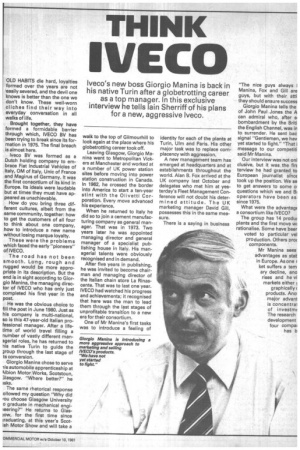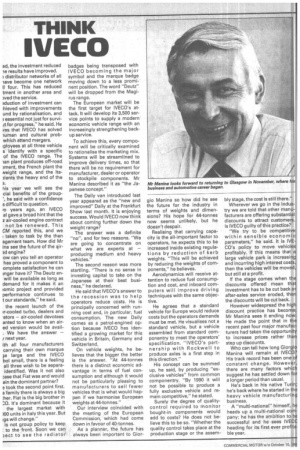THINK
Page 31

Page 32

If you've noticed an error in this article please click here to report it so we can fix it.
IVECO
Iveco's new boss Giorgio Manina is back in his native Turin after a globetrotting career as a top manager. In this exclusive interview he tells lain Sherriff of his plans for a new, aggressive lveco.
OLD HABITS die hard, loyalties formed over the years are not 'easily severed, and the devil one knows is better than the one we don't know. These well-worn cliches find their way into everyday conversation in all walks of life.
Brought together, they have formed a formidable barrier through which, IVECO BV has been trying to break since its formation in 1975. The final breach is almost here.
lveco BV was formed as a Dutch holding company to embrace Fiat Industrial Vehicles of Italy, OM of Italy, Unic of France and Magirus of Germany. It was the first consortium of its kind in Europe. Its ideals were laudable but at times they must have appeared as unachievable.
How do you bring three different cultures, albeit from the same community, together: how to get the customers of all four to think about one company, how to introduce a new name without losing marque loyalty.
These were the problems which faced the early "pioneers" of IVECO.
The road has not been smooth. Long, rough and rugged would be more appropriate in its description. But the end is in sight according to Giorgio Manina, the managing director of IVECO who has only just completed his first year in the post.
He was the obvious choice to fill the post in June 1980. Just as his company is multi-national, so is this 47-year-old Italian professional manager. After a lifetime of world travel filling a number of vastly different managerial roles, he has returned to riis native Turin to guide the group through the last stage of ts conversion.
Giorgio Manina chose to serve us automobile apprenticeship at klbion Motor Works, Scotstoun, 31asgow. "Where better?" he isks.
The same rhetorical response allowed my question "Why did eou choose Glasgow University o graduate in mechanical engileering?" He returns to Glaslow, for the first time since iraduating, at this year's Scotish Motor Show and will take a walk to the top of Gilmourhill to look again at the place where his globetrotting career took off.
Leaving Glasgow, Giorgio Manilla went to Metropolitan Vickers at Manchester and worked at a number of UK power station sites before moving into power station construction in Canada. In 1962, he crossed the border into America to start a ten-year stint with the Olivetti Corporation. Every move advanced his experience.
When he returned to Italy he did so to join a cement manufacturing company as general manager. That was in 1973. Two years later he was appointed managing director and general manager of a specialist publishing house in Italy. His managerial talents were obviously recognised and in demand.
After five years in publishing, he was invited to become chairman and managing director of the Italian chain store La Rinascente. That was to last one year. IVECO had watched his progress and achievements; it recognised that here was the man to lead them through the last stages of unprofitable transition to a new era for their consortium.
One of Mr Manina's first tasks was to introduce a feeling of identity for each of the plants at Turin, Ulm and Paris. His other major task was to replace complacency with aggression.
A new management team has emerged at headquarters and at establishments throughout the world. Alan B. Fox arrived at the UK company last October and delegates who met him at yesterday's Fleet Management Conference will not doubt his determined attitude. The UK marketing manager David Gill, possesses this in the same measure.
There is a saying in business "The nice guys always I Manina, Fox and Gill are guys, but with their atti they should ensure success Giorgio Manina tells the of John Paul Jones the A can admiral who, after st bombardment by the Briti the English Channel, was in to surrender. He sent bac signal "Gentlemen, we hay yet started to fight." "That i message to our competiti said Mr Manina.
Our interview was not onl clusive, but it was the fir; terview he had granted to European journalist sincE took up the position. We se to get answers to some o questions which we and Br operators have been as: since 1975.
What were the advantag( a consortium like IVECO? The group has 14 produ( plants and the first move wi rationalise. Some have beer voted to particular vel production. Others pro( components.
Mr Manina sees advantages as stet in Europe. As one r ket suffers a tern ary decline, ano rises and he vi markets either graphically ( products. Ana
major advent is concentrai of investm( The research development
four compai has b ed, the investment reduced he results have improved. distributor networks of all lave become one network II four. This has reduced tment in another area and wed the service.
.1duction of investment can hieved with improvements und by rationalisation, and 3 essential not just for surviit for progress," he said. He ves that IVECO has solved luman and cultural probwhich attend mergers.
iployees at all three vehicle s identify with a specific of the IVECO range. The an plant produces off-road )ment, the French plant the Neight range, and the Ita)lants the heavy end of the his year we will see the cial benefits of the group', he said with a confidence s difficult to question.
ro years ago, an IVECO al gave a broad hint that the z air-cooled engine contract
not be renewed. This CM reported this, and we
taken to task by the then agement team. How did Mr ma see the future of the air adengine?
ow can you tell an operator has proved a component to omplete satisfaction he can )nger have it? The Deutz en will be available as long as demand for it makes it an iomic project and provided performance continues to t our standards," he said,
the recent launch of the )r-cooled turbo, dealers and .ators — air-cooled devotees anted to know when an aired version would be avail. We have the answer —
next year.
ith all four manufacturers carrying their own marque }e large and the IVECO bol small, there is a feeling all three wish to be separaidentified. Was it not also ase that Fiat was and would am n the dominant partner?
a took the second point first. a family there is always a big :her. Fiat is the big brother in O. It's dominant because it the largest market with )00 units in Italy this year. But igs will change."
is not group policy to keep to the front. Soon we can pect to see the radiator badges being transposed with IVECO becoming the major symbol and the marque badge moving down to a less prominent position. The word "Deutz" will be dropped from the Magirus range.
The European market will be the first target for IVECO's attack. It will develop its 3,500 service points to supply a modern economic vehicle range with an increasingly strengthening backup service.
To achieve this, every component will be critically examined to rationalise the marketing mix. Systems will be streamlined to improve delivery times, so that there will be no requirement for manufacturer, dealer or operator to stockpile components. Mr Manina described it as "the Japanese concept."
The Daily van introduced last year appeared as the "new and improved" Daily at the Frankfurt Show last month. It is enjoying success. Would IVECO now think about coming further down the weight range?
The answer was a definite "no", and for two reasons. "We are going to concentrate on what we are experts at — producing medium and heavy vehicles."
The second reason was more startling. "There is no sense in investing capital to take on the Japanese at their best business," he declared.
He said that IVECO's answer to the recession was to help operators reduce costs. He is principally concerned with running cost and, in particular, fuel consumption. The new Daily comes as a petrol-engined option because IVECO has identified a growing market for this vehicle in Britain, Germany and Switzerland.
On vehicle weights, he believes that the bigger the better is the answer. "At 44-tonnes there is a distinct economic advantage in terms of fuel consumption and although it would not be particularly pleasing to manufacturers to sell fewer vehicles that is what would happen if we harmonise European weights at 44-tonnes."
Our interview coincided with the meeting of the European Commission, which had come down in favour of 40-tonnes.
As a planner, the future has always been important to Gior
gio Manina so how did he see the future for the industry in terms of weights and dimensions? His hope for 44-tonnes now seems unlikely, but he doesn't despair.
Realising that carrying capacity is the all-important factor to operators, he expects this to be increased inside existing regulations by reduction of kerb weights. "This will be achieved by reducing the weights of components," he believes.
Aerodynamics will receive attention to reduce fuel consumption and cost, and inboard computers will improve driving techniques with the same objective.
He agrees that a standard vehicle for Europe would reduce costs but the operators demands must be met. He visualises not a standard vehicle, but a vehicle assembled from standard cornponentry to meet the operators' specification. "IVECO's partnership with Rockwell to produce axles is a first step in this direction."
His concept can be summed up, he said, by producing "exclusive vehicles" from common componentry. "By 1990 it will not be possible to produce a fully exclusive vehicle and remain competitive," he stated.
Surely the degree of qualitycontrol required to monitor bought-in components would add to costs? He does not believe this to be so. "Whether the quality control takes place at the production stage or the assem
bly stage, the cost is still there."
Wherever we go in the industry we are told that other manufacturers are offering substantial discounts to attract customers. Is IVECO guilty of this practice?
"We try to be competitive within sensible economic parameters," he said. It is IVECO's policy to move vehicles profitably. If this means that a large vehicle park is increasing and incurring high interest costs, then the vehicles will be moved, but still at a profit.
If the stage comes when the discounts offered mean that investment has to be cut back or after-sales service eroded, then the discounts will be cut back.
However widespread the high discount practice has become, Mr Manina sees it ending now. He made the point that in the recent past four major manufacturers had taken the opportunity to increase prices rather than step up discounts.
Who can tell how long Giorgio Manina will remain at IVECO? His track record has been one of constant change. However, there are many factors which suggest he has settled down for a longer period than usual.
He's back in his native Turin; he's back where he started in the heavy vehicle manufacturing business.
A "multi-national" himself, he heads up a multi-national company; he has the ambition to be successful and he sees IVECC heading for its first ever profita. ble year.
























































